The upcoming BRICS summit in South Africa will be absolutely interesting for two reasons. First, will Russian President Vladimir Putin be arrested? Second, will French President Emmanuel Macron attend the summit? The success of BRICS in the past years has seen a rising number of countries expressing interest to join the bloc, which was set up to rival the Group of Seven (G7).
BRICS – a group of 5 major emerging economies comprising Brazil, Russia, India, China and South Africa – covers about 26.7% of the world’s land surface and 41.5% of the world population. Crucially, the bloc together contribute nearly 31.5% of the global GDP, compared to 30.7% by G7 countries. The BRICS is expected to contribute over 50% of global GDP by 2030.
All the five nations of the bloc are members of G20 or Group of Twenty. Of course, China has the largest GDP of the BRICs country at US$18.32 trillion. In a blow to G7, comprising Canada, France, Germany, Italy, Japan, the United Kingdom and the United States, the BRICS saw more than 30 countries having formally and informally applied to join the alliance.
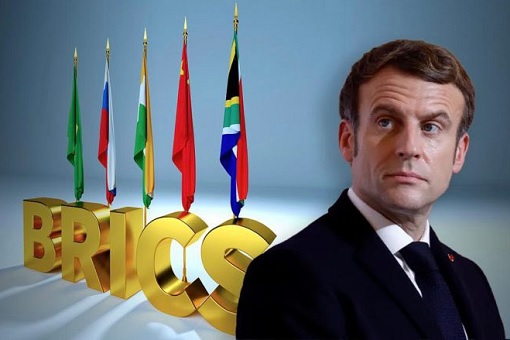
Countries ready to join the BRICS are Afghanistan, Algeria, Argentina, Bahrain, Bangladesh, Belarus, Egypt, Indonesia, Iran, Kazakhstan, Mexico, Nicaragua, Nigeria, Pakistan, Saudi Arabia, Senegal, Sudan, Syria, the United Arab Emirates, Thailand, Tunisia, Turkey, Uruguay, Venezuela, and Zimbabwe. Interestingly, the latest country interested in BRICS is France.
While President Macron has not apply to join the club, he wants to join the leaders of the BRICS nations when they meet in August in in Johannesburg. According to French media reports, Macron has asked South African President Cyril Ramaphosa for an invitation to the summit. If granted, it will be spectacular as France will be the first G7 and Western nation to participate.
To a certain extent, it would be a slap in the face of G7 as well if Macron is invited to the BRICS summit on August 22-24 because it provides legitimacy to the emerging influence and rising importance of the bloc, which is being led by China – the rival of the United States. But why France, a developed nation, was eager to join the playground of developing countries?
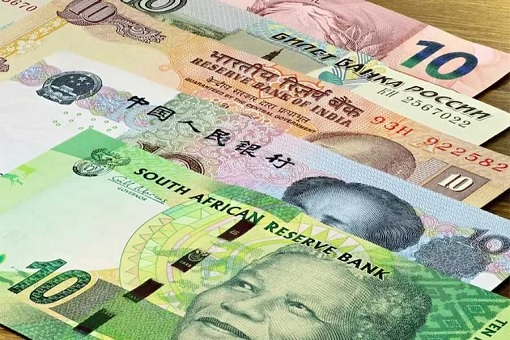
As a start, it’s not rocket science that the BRICS will grow bigger, stronger and wealthier. Hence, it makes sense for France to start engaging the alliance. Besides, unlike the Group of Seven which is an exclusive club only for the world’s largest developed economies, the BRICS grouping is opened to more friends and to promote cooperation for South-South cooperation in the world.
When Macron visited China (April 5 – April 8), he was given the full red-carpet treatment, and greeted by military parades and cannons salute on Tiananmen Square. The French president spent his final day having tea with counterpart Xi Jinping in Guangzhou, the manufacturing megacity. Both spent 6 to 7 hours together before having another dinner.
The best part was Macron’s interview with French journalists on board France’s Air Force One on his way back after the 3-day trip. He said Europe must reduce its dependency on the U.S. and avoid getting dragged into a confrontation between China and the U.S. over Taiwan. He emphasized the “strategic autonomy” for Europe, presumably led by France, to become a “third superpower.”
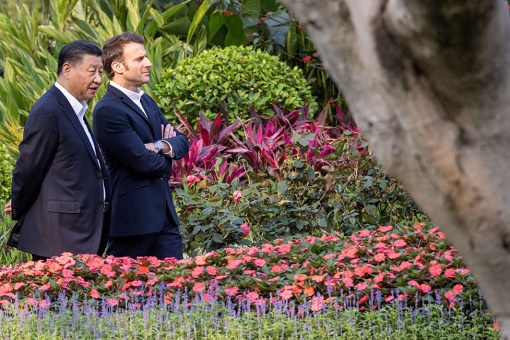
To the horror of the U.S., Macron’s strategic autonomy received endorsement from Beijing. He said the “great risk” facing Europe is that it “gets caught up in crises that are not ours, which prevents it from building its strategic autonomy.” Telling the journalists, he said – “The paradox would be that, overcome with panic, we believe we are just America’s followers.”
Aboard COTAM UNITÉ, Macron said in the interview – “The question Europeans need to answer – is it in our interest to accelerate a crisis on Taiwan? No. The worse thing would be to think that we Europeans must become followers on this topic and take our cue from the U.S. agenda and a Chinese overreaction.” But the biggest bombshell was his remark on de-dollarization.
After highlighting that Europe was too dependent on the U.S. for weapons and energy, the French president has suggested that Europe needs to reduce its dependence too on the “extraterritoriality of the US dollar.” He said – “If the tensions between the superpowers heat up, we won’t have the time or the resources to finance our strategic autonomy and we will become vassals.”
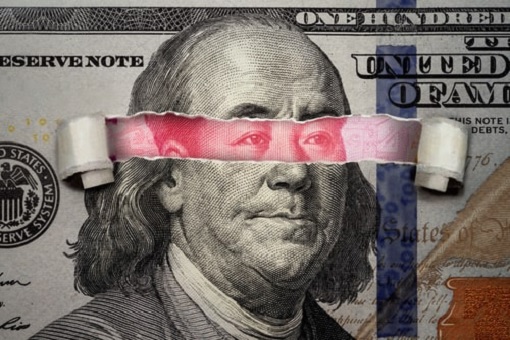
China is already in full steam, leveraging on BRICS and other trading partners to dump the dollar. The move by the U.S. and Western nations in imposing economic and financial sanctions against Russia in response to its invasion of Ukraine, which saw big Russian banks banned from SWIFT followed by freezing – even seizing – of Russia’s US$630 billion of foreign reserves, has backfired.
But de-dollarization was not confined to merely BRICS members. In another astonishing move, the Shanghai Petroleum and Natural Gas Exchange announced on March 30 that it completed its first Yuan-settled trade for liquid natural gas (LNG) between China’s National Offshore Oil Corporation and France’s TotalEnergies. Yes, even France has begun using the Chinese currency.
The first-ever deal in the Renminbi Yuan currency between the Chinese and French energy companies involved 65,000 tons of LNG imported from the United Arab Emirates (UAE). The trade marks a major step in Beijing’s attempts to challenge the “petrodollar” with the alternative “petroyuan”, something which China introduced in 2018 to give the U.S. dollar a bloody nose.
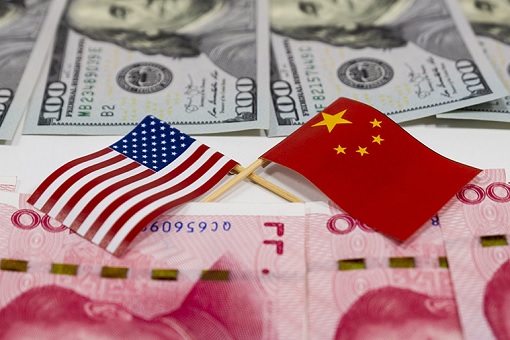
France’s interest to participate in BRICS activities could see the alliance being expanded from BRICS+ to BRICS++. Macron wanted to pursue “strategic autonomy”, which could see disagreement – even rejection – from superpower America. However, before BRICS Summit host South Africa could extend an invitation to France, Moscow has already rejected the idea.
Moscow said Macron would be an inappropriate guest at the BRICS summit, largely due to the French hostile policies against Russia. Besides saying the Kremlin must be defeated in the ongoing Ukraine War, France has pledged additional military aid, including light tanks, armored vehicles, training for soldiers and other assistance for Ukraine.
At the same time, South Africa is still considering different options regarding the invitation for Vladimir Putin because of an arrest warrant issued by the International Criminal Court (ICC) for the Russian leader for his alleged war crimes in the Ukraine conflict. South Africa is an ICC member and would theoretically be required to arrest Putin if he attends the BRICS summit.
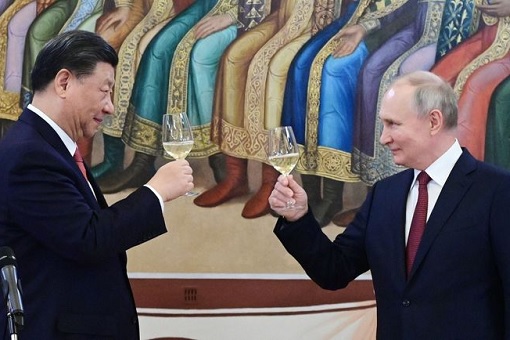
It is not clear whether Macron will be able to attend the BRICS summit or not. South Africa has to consult his fellow BRICS leaders before making a final call. The host may also be wary of upsetting his BRICS partners, especially Russia and China. However, to prevent humiliation, Macron has a backup plan – the UN Climate Change Conference (COP26) in Glasgow, Scotland.
Other Articles That May Interest You …
- Bill Gates Meets “Old Friend” Xi Jinping – And Donates $50 Million To Tsinghua & Beijing In Infectious Disease Research
- China Bullies Me!! – Austin Cries After Li Refused To Talk To Him And Chinese Warship Cuts Off U.S.-Canada Warships
- China Lectures Australia After Complains Chinese Jet Harassed Its Spy Plane – Dumping “Chaff” Which Sucked Into Engine
- Canada Air Force Complains “Unprofessional” Chinese Pilots Harassing Its Spy Plane – Sometimes Show “Middle Fingers”
- How To Protect $3.2 Trillion – China Held Meetings To Find Ways To Protect Its Assets From Potential U.S. Sanctions
- The U.S. And Australia Threaten To Invade Solomon Islands – Now Who’s The Bully And Aggressor?
- Australia-China Ties Remain Hostile – But New Zealand Upgrades Trade Deal With China That Could Bring Record $50 Billion
- The Australia-US-UK AUKUS – It’s All About Arms Sales, And China Will Spend Even More On Military To Target Aussie
- Commodities Crash – How China Releases Metal Reserves To Tackle High Prices And Shortage
- Australia’s Beef Export Worth A$3 Billion To China May Not Recover – Permanently & Completely
- Trade Surplus Of $535 Billion – Not Even The U.S. Trade War Or Covid Pandemic Can Destroy China Economic Powerhouse

|
|
June 23rd, 2023 by financetwitter
|


|

|

|

|

|

|




























Comments
Add your comment now.
Leave a Reply